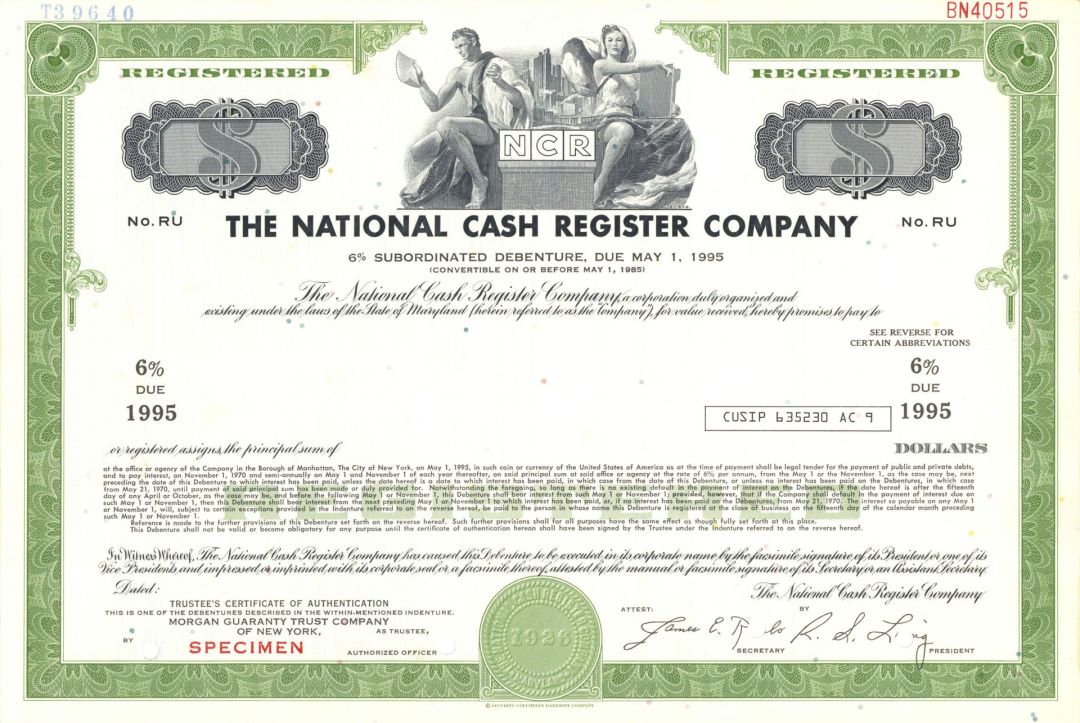National Cash Register Co. (NCR) - Specimen Bond
Inv# SE3819 Specimen BondSpecimen Bond printed by Security-Columbian Banknote Company. NCR Voyix Corporation, previously known as NCR Corporation and National Cash Register, is an American software, consulting and technology company providing several professional services and electronic products. It manufactured self-service kiosks, point-of-sale terminals, automated teller machines, check processing systems, and barcode scanners. NCR was founded in Dayton, Ohio, in 1884 and acquired by AT&T in 1991. A restructuring of AT&T in 1996 led to NCR's re-establishment on 1 January 1997, as a separate company and involved the spin-off of Lucent Technologies from AT&T. In June 2009 the company sold most of the Dayton properties and moved its headquarters to the Atlanta metropolitan area in unincorporated Gwinnett County, Georgia, near Duluth.[5][6] In early January 2018, the new NCR Global Headquarters opened in Midtown Atlanta near Technology Square (adjacent to the Georgia Institute of Technology). After the strategic business review, NCR Corporation was split into two independent public companies. NCR Voyix legally succeeded NCR Corporation, and NCR Atleos was spun off.
The company began as the National Manufacturing Company of Dayton, Ohio, and was established to manufacture and sell the first mechanical cash register invented in 1879 by James Ritty. In 1884, the company and patents were bought by John Henry Patterson and his brother Frank Jefferson Patterson, and the firm was renamed the National Cash Register Company. Patterson formed NCR into one of the first modern American companies by introducing new, aggressive sales methods and business techniques. He established the first sales training school in 1893 and introduced a comprehensive social welfare program for his factory workers. Other significant figures in the early history of the company were Thomas J. Watson, Sr., Charles F. Kettering and Edward A. Deeds. Watsonâlater fired by Patterson in 1914âeventually worked his way up to general sales manager. At an uninspiring sales meeting, Watson interrupted, saying "The trouble with every one of us is that we don't think enough. We don't get paid for working with our feet â we get paid for working with our heads". Watson then wrote THINK on the easel. Signs with this motto were later erected in NCR factory buildings, sales offices and club rooms during the mid-1890s. "THINK" later became a widely known symbol of IBM, which was created by Watson after he joined the Computing-Tabulating-Recording Company (CTR). Kettering designed the first cash register powered by an electric motor in 1906. Within a few years he developed the Class 1000 register which was in production for 40 years, and the O.K. Telephone Credit Authorization system for verifying credit in department stores. Deeds and Kettering went on to found Dayton Engineering Laboratories Company which later became the Delco Electronics Division of General Motors. In 1913, the company's market share was dominant and it was successfully prosecuted under the Sherman Antitrust Act of 1890. The ruling was appealed and executives avoided at least some of the court's strictures. Read more at https://en.wikipedia.org/wiki/NCR_Voyix
Stock and Bond Specimens are made and usually retained by a printer as a record of the contract with a client, generally with manuscript contract notes such as the quantity printed. Specimens are sometimes produced for use by the printing company's sales team as examples of the firms products. These are usually marked "Specimen" and have no serial numbers.











Ebay ID: labarre_galleries